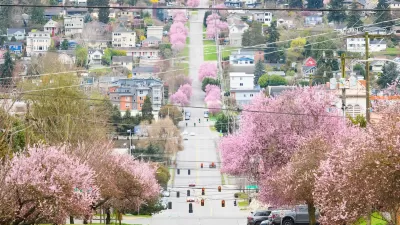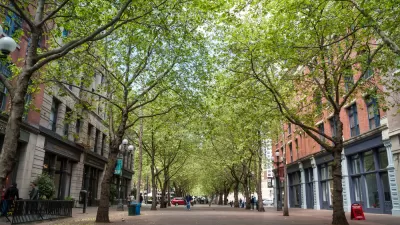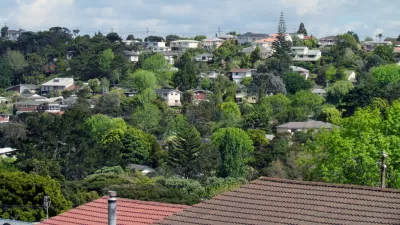A surprising argument from an article in Seattle publication Crosscut this week: density is the mortal enemy of trees.
An inflammatory article by Eric Scigliano takes Seattle's recently adopted Housing Affordability and Livability Agenda (HALA) to task for its lack of attention to the urban forest. Scigliano is clearly speaking for the trees, but in doing so also sets up a polarizing exclusion: "HALA is still a density agenda," writes Scigliano. "And density, absent special protections, is the mortal enemy of trees."
Speaking to that parenthetical caveat, Scigliano adds that the mitigation measures allowed by the city to substitute for the open space necessary to grow trees (i.e., setbacks, balconies, and green roofs) are a poor substitute for the real thing.
To many reading the article, the decision to pit density so explicitly against trees is misleading, at best. Ben Crowther quickly took to The Urbanist, another local publication, to respond. To open the rebuttal, Crowther states that Scigliano's article "is novel in its use of environmental values to discourage one of the single greatest tools we have in promoting sustainability: dense, urban living."
After debunking the false choice between density and the urban tree canopy, Crowther points out that more people living in dense urban centers means fewer people moving to suburbs and exurbs, "fueling deforestation as sprawl expands into our meadows and foothills, replacing natural beauty with low density residential subdivision developments and strip malls."
Crowther agrees with Scigliano that the urban tree canopy is a worthy cause to support, and also diplomatically notes that Scigliano's article got a lot of things right. The false choice does seem an unfortunate overstep, when much of Scigliano's point is to debunk misreporting of tree data and suggest possible protections for trees in the face of development.
FULL STORY: Saving Seattle’s trees may mean saving their yards

Maui's Vacation Rental Debate Turns Ugly
Verbal attacks, misinformation campaigns and fistfights plague a high-stakes debate to convert thousands of vacation rentals into long-term housing.

Planetizen Federal Action Tracker
A weekly monitor of how Trump’s orders and actions are impacting planners and planning in America.

San Francisco Suspends Traffic Calming Amidst Record Deaths
Citing “a challenging fiscal landscape,” the city will cease the program on the heels of 42 traffic deaths, including 24 pedestrians.

Adaptive Reuse Will Create Housing in a Suburban Texas Strip Mall
A developer is reimagining a strip mall property as a mixed-use complex with housing and retail.

Study: Anti-Homelessness Laws Don’t Work
Research shows that punitive measures that criminalized unhoused people don’t help reduce homelessness.

In U.S., Urban Gondolas Face Uphill Battle
Cities in Latin America and Europe have embraced aerial transitways — AKA gondolas — as sustainable, convenient urban transport, especially in tricky geographies. American cities have yet to catch up.
Urban Design for Planners 1: Software Tools
This six-course series explores essential urban design concepts using open source software and equips planners with the tools they need to participate fully in the urban design process.
Planning for Universal Design
Learn the tools for implementing Universal Design in planning regulations.
Heyer Gruel & Associates PA
JM Goldson LLC
Custer County Colorado
City of Camden Redevelopment Agency
City of Astoria
Transportation Research & Education Center (TREC) at Portland State University
Jefferson Parish Government
Camden Redevelopment Agency
City of Claremont





























